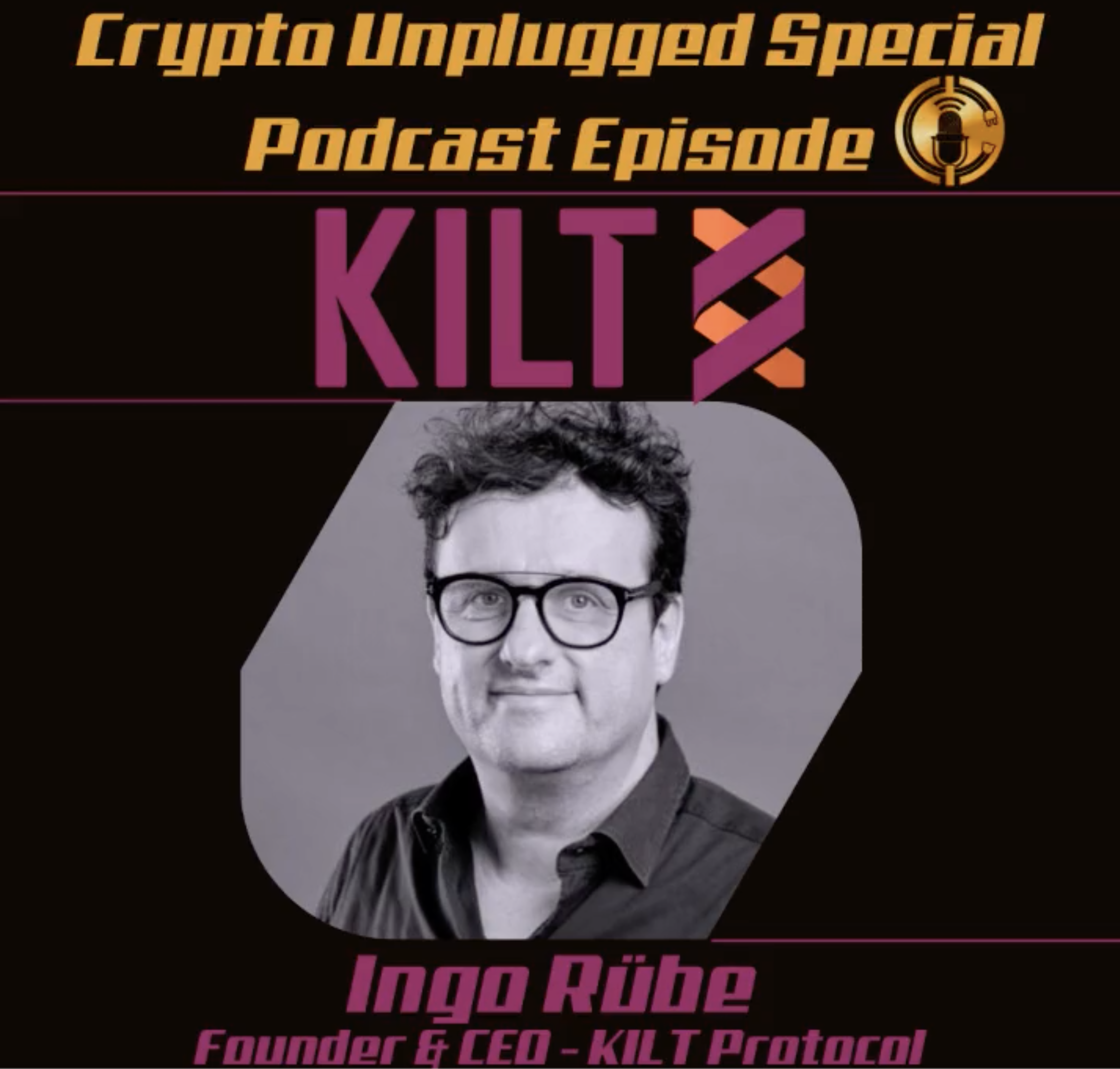KILT Protocol
Social KYC and Digital Identity
Dr. Crypto:
Fantastic. So, you would say or we would say that you became a believer in blockchain instantly.
Ingo:
Instantly, maybe not. First, I found it interesting. And then it took me a lot of research, actually, not until I became a believer as I just don't believe in everything that's complicated. Normally it's much easier to believe in things which are straightforward and easy to understand. But blockchain is an exception to that. So, if you really dig into it, then you can start to believe,
Oz:
Can you tell the listeners what KILT is about and also what problem it's solving in the blockchain crypto space?
Ingo:
Yeah, sure. So, we found that there's actually no real good solution for digital identity totally. Apart from blockchain, there is no good solution for digital identity, everything that we do right now with Auth 2 and all those things this is centralising the world. It's centralising power. It's taking away freedom and permissions from people, and this is actually what we don't want. So, I think that digital identity is generally broken. And what we were thinking about is can blockchain technology maybe help to overcome the difficulties which we have in digital identity, because digital identity is something that we need because we moving from a paper-based or plastic based society, more and more into digital identity, a digital society. And when the identity thing is not solved, well then, we have a huge problem. So, we said, okay let's try to solve it, or let's try to deliver a solution which could solve it.
And this is basically what KILT is about, and this is also a big part of the Web3 movement, obviously, because about Web3 is the people who understand that the tool is basically broken many, many ways be it storage, be it trust, be it identity, many, many things are actually broken there. And this is why we very early, joined the about Web3 movement and want to become the go-to place for digital identity in in the Web3 world. So, this is basically what KILT is all about.
Oz:
So, just one thing, just a very technical, and I'm trying to get my head round on all of this, and I'm sure the listeners as well. So, as long as you have your private key, nobody can access your credentials, your data. Is that, is that right? Because the private key obviously is unique. And as long as someone hacks into that or gets hold of that, your data is safe
Ingo:
At your computer anyway, but it's worthless without the private key. So, you can, because the verifier would like to have your credential signed from you. So, to make sure that it's you and not someone else, that means, you know, that saying in the internet, no one knows that you are a dog that shouldn't happen in, in our system because in, in the physical world people show, people look at your identifier, right? They look at your picture, how will you do that in the internet? And this is what we do with the identify. So, the identifier is linked to the private key, and you have your credential with you and you choose when to use it. But when you use it, you sign it with your private key or you did in a way and then send it out so that the, so that the verifier can check that not only the credential is valid, it is issued by the right person or the, by the right entity. It is also valid on the current blockchain, and it is signed by you so that they can make sure they got a valid credential, which is issued by the right entity and presented by the correct person. Excellent.
Dr. Crypto:
Interesting expression you use there in: “doomed to work together”, but I'm sure there are positives in that “doomed to work together”. And go, so I'm going to ask you about KILT Protocol’s developments. I mean, how does KILT Protocol, how is it developing currently? Because KILT Protocol has been in a development stage or, you know when everybody's the edge of their tongues, as you can see. So, can you describe the current development status and you know, future expansion plans, and expected applications?
Ingo:
Yeah, sure. So, why isn't it like yet? Well, Parachains are premier, so people are running and tested mode for quite a while. But that wasn't boring because we had the chance of starting collaborations with many other projects, starting projects here and also building software around it and all that. So, that's, that's it it was not like we were sitting here for half a year and waiting to just go live. It's, there's, there's always a lot of, a lot of things that we can do. And we are right now in the stage where we are I think that was announced already. So, I can say that that we are going to be in the next batch of parachain auctions. We expect to go live within the, I don't know when they start, but in the next maybe weeks or months hopefully not months go live with this thing.
And this is basically where the development status is. So, it's going to go live and then gradually like a normal, like normal in thePolkadot ecosystem, over a period of one- or two-months feature by feature is being added. And then we removed the Sudo Key, which means that the system is going to be decentralised. And it's basically governance owned or community owned. So, we, I'm pretty sure that we will reach this goal of having a completely community owned system earlier the end of the year, I would say, so that's the current plan. And then all the functionality around verifiable credentials, DIDs, and all that is already baked into the system and can use by anyone. So, this is already there. And then of course, there's other things to come. The, the biggest feature, which is going to come later, but, but later really means later that would be like maybe a year after the go live would be the so-called VCOs that's organisations, basically that issue verifiable credentials and they are, and those organisations are virtual. So, they are living only on the blockchain. So, this is a pretty new and a pretty exciting idea. And this is going to, this is going to be the second stage.
Dr. Crypto:
So, how does KILT Protocol solve this issue that eliminates any type of risk of centralisation?
Ingo:
Well, first of all, I think.....
Listen to the full interview here..















Discussion